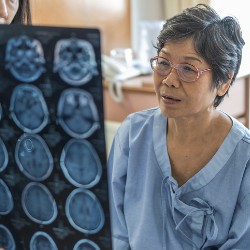New KL2 Career Development Awardees Investigate Lung Disease, Frailty in Colon Cancer Survivors
The UR CTSI has selected two new awardees for its KL2 Career Development Award program, which supports the early career development of multidisciplinary clinical and translational scientists. The program provides two years of funding to help early-career scientists obtain independent funding for their innovative research.
2020 KL2 Career Development Awardees:
Assistant Professor in the Department of Pediatrics, Division of Pulmonary Medicine
Project title: Basal Cell Dysfunction in Flavoring Induced Lung Disease
Inhaling certain chemicals, like diacetyl, which is found in foods, wine and e-cigarettes, is associated with a fibrotic lung disease called bronchiolitis obliterans. Currently, lung transplantation is the only treatment option for patients with bronchiolitis obliterans. Current therapies are limited due to our lack of knowledge of how certain chemicals exposures contribute to this devastating fibrotic lung disease.
McGraw will investigate the mechanisms by which this chemical causes airway stem cell death and will try to block cell death of this rare lung population to prevent the onset of fibrotic lung disease. His research will potentially identify new medical therapies for treatment of lung disease associated with inhalation of toxic flavoring chemicals found in e-cigarettes.
Research Assistant Professor in the Department of Surgery, Cancer Control Division and Geriatric Oncology
Project Title: Reducing Frailty for Older Cancer Survivors Using Supplements (ReFOCUS): A Phase 2 Randomized Controlled Trial of Epigallocatechin-3-Gallate (EGCG) on Frailty and Inflammation in Older Survivors of Colon Cancer
Frailty is a significant problem for survivors of colon cancer over the age of 65, and disproportionately affects African Americans/Blacks who also bear the highest burden of colon cancer. Because inflammation is a major contributor to frailty, Gilmore plans to investigate whether epigallocatechin-3-gallate (EGCG), a known anti-inflammatory dietary supplement, can reduce frailty and improve post-treatment outcomes for older colon cancer survivors, especially African Americans/Blacks.
She will conduct a two-arm randomized controlled trial comparing EGCG supplementation to usual care in older adults with colon cancer. By oversampling for African Americans/Blacks and investigating the effects of supplementation by race, she hopes to determine whether EGCG could be a health-equitable intervention.
###
The projects described above are supported by the University of Rochester CTSA award number KL2 TR001999 from the National Center for Advancing Translational Sciences of the National Institutes of Health. The content is solely the responsibility of the authors and does not necessarily represent the official views of the National Institutes of Health.
Michael Hazard | 8/17/2020



